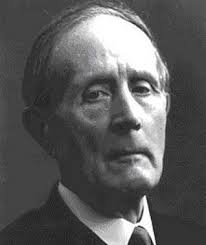Monovar · 8.6.1873 – Madrid · 2.3.1967
The writer known as Azorín (José Martínez Ruiz “Azorín”) was born in Monovar in the province of Alicante in 1873. After studying Law at Valencia University, he began contributing to the newspapers El mercantil valenciano and El País, an activity that later led to his work for other newspapers such as El Imparcial, El Globo and ABC, and to covering the First World War as a war correspondent.
Azorín‘s literary output comprises over a hundred works, taking in every literary genre except poetry. His first steps as a writer took the form of a number of pamphlets, the first of which he entitled La crítica literaria (Literary Criticism, 1893). 1897 saw the publication of Chirivari, a light-hearted presentation of Madrid life in the form of a private diary, and Bohemia, a collection of short stories. Following the appearance of Alma castellana (Castilian Soul) in 1900, he came to form part of the hard core of the group of artists and intellectuals that were to be dubbed the “Generation of 98” (in reference to the traumatic loss of the last of Spain’s colony in 1898), along with writers Pío Baroja and Ramiro de Maetzu.
Between 1902 and 1904, he added three notable and highly distinctive works to his bibliography, pioneering a more intimate, personal state in the writer’s life: La voluntad (Willpower, 1902), Antonio Azorín (1903) and Las confesiones de un pequeño filósofo (Confessions of a Little Philosopher, 1904).
In the sphere of the novel, outstanding works of his include Don Juan (1922), Doña Inés (1925) and a work in which he tried out new forms of literary expression: Superrealismo (Super-realism, 1929). Also noteworthy are his collections of articles, such as Al margen de los clásicos (Marginal notes on the classics, 1916) and Racine y Molière (1924); his autobiographical confessions in Paris (1945) and Memorias Inmemoriales (Immemorial Memories, 1946); and his work as a playwright from 1926 to 1936, a period that saw the publication of Comedia del arte and Lo invisible (The Invisible).
Azorín died in Madrid in 1967.
